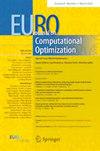A distributionally robust optimization approach for two-stage facility location problems
Abstract
In this paper, we consider a facility location problem where customer demand constitutes considerable uncertainty, and where complete information on the distribution of the uncertainty is unavailable. We formulate the optimal decision problem as a two-stage stochastic mixed integer programming problem: an optimal selection of facility locations in the first stage and an optimal decision on the operation of each facility in the second stage. A distributionally robust optimization framework is proposed to hedge risks arising from incomplete information on the distribution of the uncertainty. Specifically, by exploiting the moment information, we construct a set of distributions which contains the true distribution and where the optimal decision is based on the worst distribution from the set. We then develop two numerical schemes for solving the distributionally robust facility location problem: a semi-infinite programming approach which exploits moments of certain reference random variables and a semi-definite programming approach which utilizes the mean and correlation of the underlying random variables describing the demand uncertainty. In the semi-infinite programming approach, we apply the well-known linear decision rule approach to the robust dual problem and then approximate the semi-infinite constraints through the conditional value at risk measure. We provide numerical tests to demonstrate the computation and properties of the robust solutions.

 求助内容:
求助内容: 应助结果提醒方式:
应助结果提醒方式:


